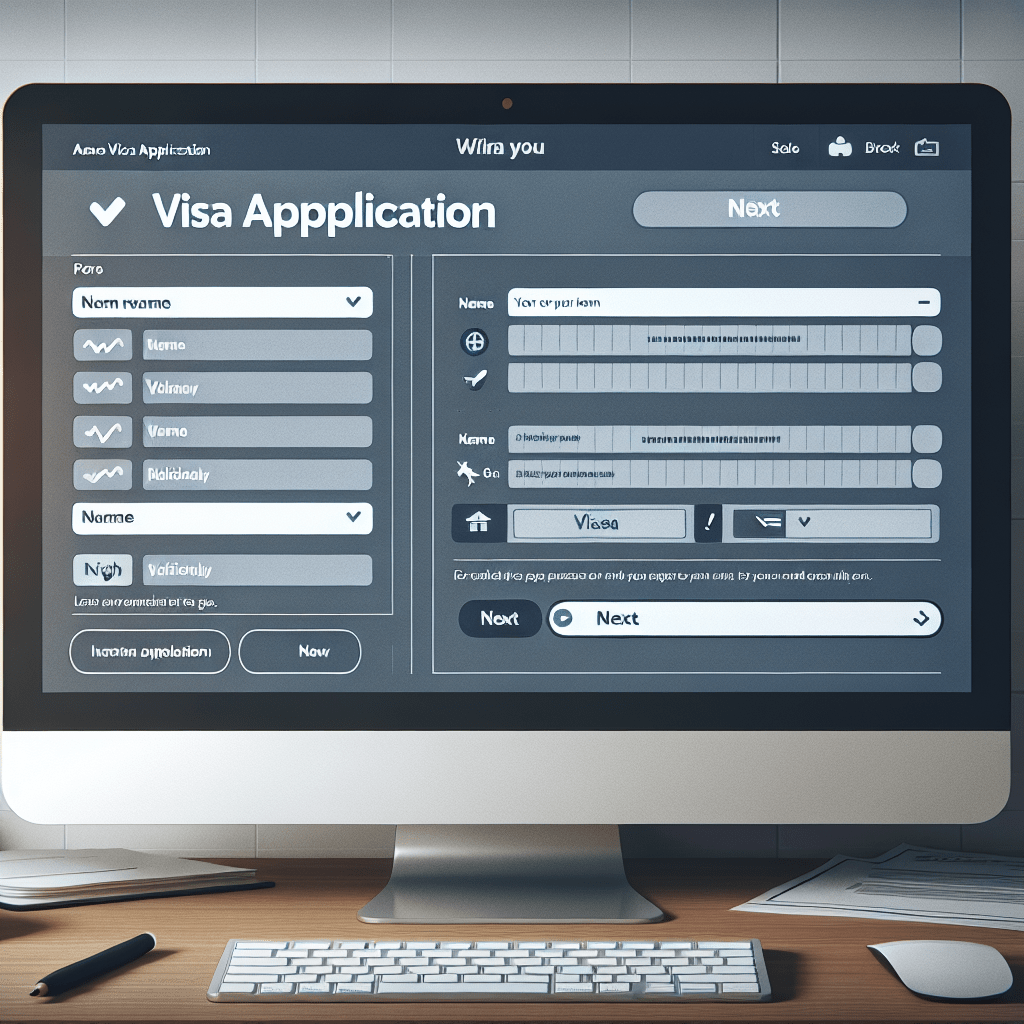What is the travel visa 2025?

The landscape of international travel is undergoing a significant transformation, with the advent of digital solutions reshaping how travelers obtain necessary documentation. Among these innovations, the rise of e-visas stands out as a pivotal development. As we approach 2025, the concept of the travel visa is evolving to meet the demands of a more connected and technologically advanced world. This shift is not just about convenience; it represents a fundamental change in how countries manage border security and facilitate tourism.
The year 2025 is poised to be a landmark in the realm of international travel, as nations worldwide adopt more sophisticated and secure electronic visa systems. These systems are designed to streamline the visa application process, making it more efficient and accessible for travelers. The significance of this year lies in the widespread implementation of digital travel authorization, which promises to enhance the travel experience while maintaining stringent security measures.
Exploring the concept of the travel visa in 2025 involves understanding the technological advancements and policy changes that are driving this evolution. By examining these developments, we can gain insights into the future of global travel and the role that e-visas will play in shaping it. For more information on e-visa 2025, visit SimpleVisa.

The evolution of visa requirements
Historical context of traditional visas
For decades, traditional visas have been a cornerstone of international travel, serving as a critical tool for countries to regulate entry and ensure security. The process of obtaining a traditional visa often involves a significant amount of paperwork, including application forms, passport photos, and supporting documents such as proof of accommodation and financial stability. Applicants typically need to visit embassies or consulates, sometimes multiple times, to submit their documents and attend interviews. This process can be time-consuming and cumbersome, often requiring travelers to plan their trips well in advance.
Travelers have faced numerous challenges with conventional visas, ranging from long processing times to the uncertainty of approval. The requirement to physically visit a consulate can be particularly burdensome for those living in remote areas or countries without a local diplomatic presence. Additionally, the lack of transparency in the application process can lead to frustration, as applicants may not understand the reasons for delays or denials. These challenges have highlighted the need for a more efficient and user-friendly approach to visa issuance.
The shift towards digital solutions
In response to the limitations of traditional visa processes, many countries have begun to adopt digital solutions, leading to the emergence and growth of e-visas. The electronic visa process offers a streamlined alternative, allowing travelers to complete their visa application online from the comfort of their homes. This shift has been driven by advancements in technology and the increasing demand for more efficient travel solutions. E-visas eliminate the need for physical paperwork and in-person visits, significantly reducing the time and effort required to obtain a visa.
Countries that have implemented e-visas have reported numerous benefits, both for travelers and their own administrative processes. For travelers, the convenience of an online visa application and faster processing times are major advantages. For governments, e-visas offer enhanced security features, such as biometric data collection and digital travel authorization, which help to prevent fraud and ensure that only eligible individuals are granted entry. Success stories from countries like Australia, India, and Turkey demonstrate the positive impact of e-visas on tourism and international relations.
Future projections for visa processes
As we look towards the future, the introduction of advanced technologies is expected to bring further changes to visa processes. Innovations such as artificial intelligence, blockchain, and biometric verification are poised to enhance the security and efficiency of e-visa systems. These technologies can help to automate the screening process, reduce processing times, and improve the accuracy of identity verification. As a result, travelers can expect a more seamless and secure experience when applying for visas.
There is also potential for global standardization of e-visa processes, which could simplify travel for individuals visiting multiple countries. By adopting common standards and protocols, countries can facilitate easier cross-border travel and enhance international cooperation. This could lead to the development of a secure e-visa platform that is recognized and accepted worldwide, further streamlining the travel experience. As we approach 2025, these advancements in travel visa technology are set to redefine the way we think about international travel and border management.

Key features of the travel visa 2025
Technological advancements
The travel visa landscape in 2025 is set to be revolutionized by technological advancements, with artificial intelligence (AI) and machine learning playing pivotal roles in streamlining visa approvals. These technologies are being integrated into the electronic visa process to enhance efficiency and accuracy. AI algorithms can quickly analyze vast amounts of data, identifying patterns and anomalies that might indicate potential security risks. This capability allows for faster decision-making, reducing the e-visa processing time and providing applicants with quicker responses.
Another significant technological advancement is the integration of biometric data into the visa application process. Biometric verification, which includes fingerprint scanning, facial recognition, and iris scanning, offers a higher level of security by ensuring that the individual applying for the visa is indeed the person they claim to be. This technology not only helps prevent identity fraud but also facilitates a more seamless travel experience, as travelers can be quickly and accurately identified at border checkpoints. The secure e-visa platform of the future will likely rely heavily on these biometric technologies to maintain the integrity of international travel.
User-friendly application processes
One of the primary goals of the travel visa 2025 is to create a more user-friendly application process for travelers. Simplification of application procedures is a key focus, with efforts being made to reduce the complexity and time required to complete a visa application online. The introduction of digital visa solutions aims to make the process as straightforward as possible, allowing applicants to easily navigate the system and submit their information without unnecessary hurdles.
Improved accessibility is another crucial aspect of the future of e-visas. By leveraging virtual visa services, countries can ensure that their visa systems are accessible to a diverse range of demographics, including those with limited internet access or technological proficiency. This includes offering multilingual support, mobile-friendly platforms, and assistance for individuals with disabilities. By making the online visa application process more inclusive, countries can attract a broader spectrum of travelers, boosting tourism and international engagement.
Global adoption and cooperation
The travel visa 2025 is characterized by increased global adoption and cooperation among nations. Collaborative efforts are underway to facilitate seamless travel across borders, with countries working together to harmonize their e-visa requirements and processes. This cooperation is essential for creating a cohesive global travel ecosystem, where travelers can move between countries with minimal friction and maximum security.
The impact of these collaborative efforts extends beyond individual travelers, influencing tourism and international business development. By adopting a unified approach to digital travel authorization, countries can enhance their appeal as travel destinations, encouraging more visitors and boosting their economies. Additionally, streamlined visa processes can facilitate international business by making it easier for professionals to attend conferences, meetings, and other events abroad. As global e-visa trends continue to evolve, the emphasis on cooperation and standardization will play a crucial role in shaping the future of international travel.

The potential impact on travelers
Enhanced travel experiences
The travel visa 2025 promises to significantly enhance the travel experience by reducing wait times and decreasing the amount of paperwork required. With the implementation of a streamlined electronic visa process, travelers can expect faster approvals and less time spent on administrative tasks. The convenience of completing a visa application online means that travelers can focus more on planning their trips and less on bureaucratic hurdles. This efficiency not only saves time but also reduces the stress associated with preparing for international travel.
Moreover, the future of e-visas will facilitate greater ease in exploring multiple destinations. As countries adopt digital travel authorization systems, travelers will find it simpler to obtain visas for several countries in a single trip. This is particularly beneficial for those embarking on multi-country tours or business trips that require visits to various locations. By minimizing the logistical challenges of securing multiple visas, the travel visa 2025 will open up new possibilities for exploration and adventure.
Addressing security and privacy concerns
As the travel visa landscape evolves, addressing security and privacy concerns remains a top priority. The integration of advanced travel visa technology, such as biometric verification and secure e-visa platforms, is designed to protect personal data and ensure confidentiality. These measures are crucial for maintaining traveler confidence in the safety of their information. By implementing robust security protocols, countries can prevent unauthorized access to sensitive data and safeguard against identity theft.
Traveler confidence is further bolstered by transparent e-visa policy changes that prioritize data protection. Governments are increasingly aware of the importance of building trust with travelers, and they are taking steps to communicate their commitment to privacy. This includes providing clear information about how personal data is used and stored, as well as offering assurances that data will not be shared without consent. As a result, travelers can feel more secure in their interactions with digital visa solutions, knowing that their information is being handled responsibly.
Encouragement of global mobility
The travel visa 2025 is set to encourage global mobility by creating opportunities for cultural exchange and fostering global understanding. By simplifying the visa application process and reducing barriers to entry, more people will have the chance to experience different cultures and connect with individuals from diverse backgrounds. This increased mobility can lead to greater appreciation and respect for cultural differences, promoting peace and cooperation on a global scale.
Additionally, the expansion of travel opportunities will make it possible for more people worldwide to explore new destinations. As e-visa requirements 2025 become more accessible, individuals from various socioeconomic backgrounds will have the chance to travel internationally. This democratization of travel can lead to economic benefits for both travelers and host countries, as tourism and international business activities flourish. By embracing global e-visa trends, the travel visa 2025 will play a pivotal role in shaping a more interconnected and inclusive world.

Conclusion
The transformative potential of the travel visa 2025 is immense, promising to redefine the way we approach international travel. By leveraging cutting-edge technologies such as AI, machine learning, and biometric verification, the future of e-visas is set to offer a more efficient, secure, and user-friendly experience for travelers worldwide. The shift from traditional visa processes to digital travel authorization not only reduces the administrative burden on travelers but also enhances security measures, ensuring that international borders remain safe and well-regulated.
As we move towards 2025, the ongoing e-visa system update will continue to streamline the application process, making it more accessible to a diverse range of travelers. This evolution is not just about convenience; it represents a fundamental change in how countries manage their borders and interact with the global community. The travel visa 2025 is poised to facilitate greater global mobility, allowing individuals to explore new destinations with ease and confidence. This increased accessibility will undoubtedly lead to a richer, more interconnected world, where cultural exchange and mutual understanding are at the forefront of international relations.
The broader implications for international relations and the future of global travel are profound. As countries collaborate to harmonize their e-visa requirements and processes, we can expect to see a more cohesive global travel ecosystem. This cooperation will not only enhance the travel experience for individuals but also strengthen diplomatic ties and foster economic growth. By embracing digital visa solutions, nations can position themselves as attractive destinations for tourism and international business, driving economic development and cultural exchange.
Looking ahead, the travel visa 2025 will play a crucial role in shaping the future of global travel. As we continue to innovate and adapt to the changing landscape, the emphasis on security, accessibility, and cooperation will remain central to the success of e-visa systems. By prioritizing these values, we can create a world where travel is not only a possibility but a reality for people from all walks of life. The journey towards a more connected and inclusive global community is well underway, and the travel visa 2025 is at the heart of this exciting transformation.